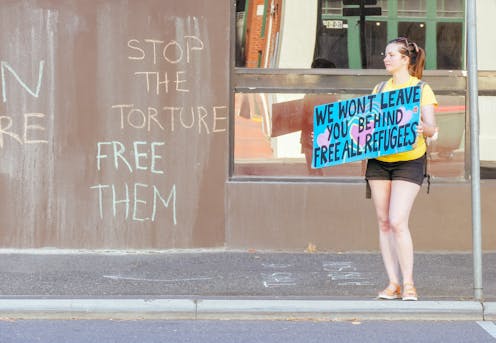
The life of limbo for people in immigration detention is often deeply traumatic. In this week’s episode of The Conversation Weekly, we talk to two experts on immigration detention in Australia and the UK about why people are waiting months, sometimes years, for a decision about their future – and the impact it’s having on them.
And as Russia’s invasion of Ukraine pushes more than two million refugees to flee the country, we speak to a sociologist about Russia’s history of using refugees from Ukraine as geopolitical tools.
The Park Hotel in Melbourne made headlines in January this year when tennis star Novak Djokovic was temporarily detained there. Djokovic, who was scheduled to play the Australian Open, was unvaccinated and had his visa revoked by the Australian government. The incident drew attention to the plight of more than 30 refugees held at the Park Hotel, which has been used as a makeshift immigration detention facility since 2019. Many of the people held there had been transferred from the notorious offshore processing sites on Nauru, an island nation in the Pacific, and on Manus Island in Papua New Guinea.
“In early 2022, there are about 70 people who were flown back from offshore for medical reasons but are still detained,” explains Madeline Gleeson, a senior research fellow at the Andrew and Renata Kaldor Centre for International Refugee Law at UNSW Sydney in Australia.
“They have no right to challenge the fact or length of their detention in a court,” says Gleeson. “They really have very limited access to the courts at all. They certainly have no right to a visa, no right to remain in Australia – and for most of them, no right to go anywhere else either. It’s a really difficult form of limbo, both practically, physically and legally.”
Government data published in late 2021 shows Australia holds people in immigration for an average of 689 days, which Human Rights Watch says is the highest on record.
But Australia is not alone in detaining people for indefinite amounts of time on immigration grounds. In the UK, thousands of people are detained each year by the UK Home Office in immigration removal centres. Some may be there for administrative reasons before being deported, others may be awaiting the result of an asylum application or appeal, while others may be in detention if their visa expired. Blerina Kellezi, an associate professor in social and trauma psychology at Nottingham Trent University in the UK, has interviewed detainees and staff at two detention centres in England. She says the facilities look, smell and feel like prisons.
“Time is very, very difficult to pass,” says Kellezi. “There is that sense of uncertainty and loss of control over one’s life.” One detainee explained to her that “at the beginning, you look like a human being, you’re dressed with normal clothes, and then after a few days you start wearing slippers and your shoulders go down – you lose that energy because they are such distressing places”.
This episode of The Conversation Weekly is supported by the UK/Australia Season Patrons Board, the British Council and the Australian Government as part of the UK/Australia Season, which centres on the theme Who Are We Now? The season’s programme reflects on the two countries’ shared history, explores their current relationship, and imagines their future together.
The Russian invasion of Ukraine has renewed attention on the plight of millions of refugees who’ve been fleeing the fighting to other parts of the country and to neighbouring countries. Since 2014, millions of Ukrainians have already been displaced from their homes by the war in eastern Ukraine, or by the Russian annexation of Crimea. Irina Kuznetsova, senior lecturer in sociology at the University of Birmingham in the UK, says people who’ve already been displaced once are now likely to be displaced again.
Kuznetsova, who has interviewed displaced people both in Ukraine and some of more than a million who’ve gone to Russia, explains how Russia has been using refugees as “geopolitical tools”. She says that underpinning the assistance provided by Russia to Ukrainians was the idea of helping “brotherly people”. This campaign around Ukrainian refugees, she says, helped to amplify Russian President Vladimir Putin’s insistence that Ukrainians and Russians are part of the same nation.
And Martine Turenne, editor in chief for The Conversation in Montreal, Canada, recommends some recent stories tied to International Women’s Day.
This episode of The Conversation Weekly was produced by Mend Mariwany and Gemma Ware, with sound design by Mau Loseto. Our theme music is by Neeta Sarl. You can find us on Twitter @TC_Audio, on Instagram at theconversationdotcom or via email. You can also sign up to The Conversation’s free daily email here.
Newsclips in this episode are from Al Jazeera English and ITV News.
You can listen to The Conversation Weekly via any of the apps listed above, download it directly via our RSS feed, or find out how else to listen here.
This article was originally published on The Conversation. Read the original article.







